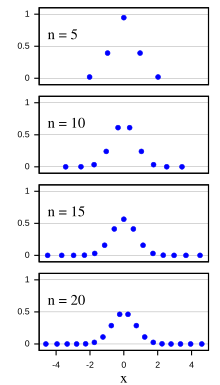Gauss–Hermite quadrature
Appearance
(Redirected from Hermite Quadrature)

In numerical analysis, Gauss–Hermite quadrature is a form of Gaussian quadrature for approximating the value of integrals of the following kind:
In this case
where n is the number of sample points used. The xi are the roots of the physicists' version of the Hermite polynomial Hn(x) (i = 1,2,...,n), and the associated weights wi are given by [1]
Example with change of variable
[edit]Consider a function h(y), where the variable y is Normally distributed: . The expectation of h corresponds to the following integral:
As this does not exactly correspond to the Hermite polynomial, we need to change variables:
Coupled with the integration by substitution, we obtain:
leading to:
References
[edit]- ^ Abramowitz, M & Stegun, I A, Handbook of Mathematical Functions, 10th printing with corrections (1972), Dover, ISBN 978-0-486-61272-0. Equation 25.4.46.
- Olver, Frank W. J.; Lozier, Daniel M.; Boisvert, Ronald F.; Clark, Charles W., eds. (2010), "Quadrature: Gauss–Hermite Formula", NIST Handbook of Mathematical Functions, Cambridge University Press, ISBN 978-0-521-19225-5, MR 2723248.
- Shao, T. S.; Chen, T. C.; Frank, R. M. (1964). "Tables of zeros and Gaussian weights of certain associated Laguerre polynomials and the related generalized Hermite polynomials". Math. Comp. 18 (88): 598–616. doi:10.1090/S0025-5718-1964-0166397-1. MR 0166397.
- Steen, N. M.; Byrne, G. D.; Gelbard, E. M. (1969). "Gaussian quadratures for the integrals and ". Math. Comp. 23 (107): 661–671. doi:10.1090/S0025-5718-1969-0247744-3. MR 0247744.
- Shizgal, B. (1981). "A Gaussian quadrature procedure for use in the solution of the Boltzmann equation and related problems". J. Comput. Phys. 41 (2): 309–328. doi:10.1016/0021-9991(81)90099-1.
External links
[edit]- For tables of Gauss-Hermite abscissae and weights up to order n = 32 see http://www.efunda.com/math/num_integration/findgausshermite.cfm.
- Generalized Gauss–Hermite quadrature, free software in C++, Fortran, and Matlab



![{\displaystyle w_{i}={\frac {2^{n-1}n!{\sqrt {\pi }}}{n^{2}[H_{n-1}(x_{i})]^{2}}}.}](https://wikimedia.org/api/rest_v1/media/math/render/svg/2e6f152a1e9ecd4ab8ddf912aaa69bb8d0e66a3c)

![{\displaystyle E[h(y)]=\int _{-\infty }^{+\infty }{\frac {1}{\sigma {\sqrt {2\pi }}}}\exp \left(-{\frac {(y-\mu )^{2}}{2\sigma ^{2}}}\right)h(y)dy}](https://wikimedia.org/api/rest_v1/media/math/render/svg/4aed1ad69a06a54aca7ef1b6cf0d2f1ee8b5462e)

![{\displaystyle E[h(y)]=\int _{-\infty }^{+\infty }{\frac {1}{\sqrt {\pi }}}\exp(-x^{2})h({\sqrt {2}}\sigma x+\mu )dx}](https://wikimedia.org/api/rest_v1/media/math/render/svg/7a9f8ddc4824a2e554c833573d0e02eb907830ef)
![{\displaystyle E[h(y)]\approx {\frac {1}{\sqrt {\pi }}}\sum _{i=1}^{n}w_{i}h({\sqrt {2}}\sigma x_{i}+\mu )}](https://wikimedia.org/api/rest_v1/media/math/render/svg/dd381d046b51bf2b8ec4f1368342fc2cec0c13e2)

